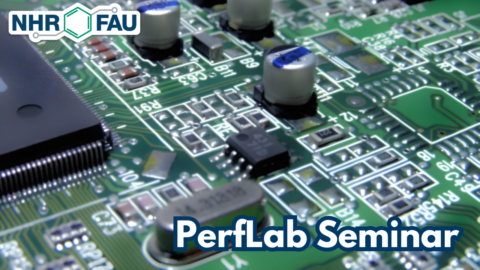NHR PerfLab Seminar: Efficient and Robust Hardware for Neural Networks (January 14, online)
Title: Efficient and robust hardware for neural networks
Speaker: Prof. Dr. Grace Li Zhang, Technische Universität Darmstadt
Date and time: Tuesday, January 14, 2025, 2.00 p.m. CET
Abstract
The last decade has witnessed significant breakthroughs of deep neural networks (DNNs) in many fields. These breakthroughs have been achieved at extremely high computation and memory costs. Accordingly, the increasing complexity of DNNs has led to a quest for efficient hardware platforms. In this talk, class-aware pruning is first presented to reduce the number of multiply-and-accumulate (MAC) operations in DNNs. Class-exclusion early-exit is then examined to reveal the target class before the last layer is reached. To accelerate DNNs, digital accelerators such as systolic arrays from Google can be used. Such an accelerator is composed of an array of processing elements to efficiently execute MAC operations in parallel. However, such accelerators suffer from high energy consumption. To reduce energy consumption of MAC operations, we select quantized weight values with good power and timing characteristics. To reduce energy consumption incurred by data movement, the logic design of neural networks is presented. Analog In-Memory-Computing platform based on RRAM crossbars will also be discussed. In the end, ongoing research topics and future research plans will be summarized.
Short Bio
 Grace Li Zhang received the Dr.-Ing. degree from the Technical University of Munich (TUM) in 2018. She joined TU Darmstadt in 2022 as a Tenure Track Assistant Professor. She leads the Hardware for Artificial Intelligence Group. Her research focuses on efficient hardware acceleration for AI algorithms and systems, AI computing with emerging devices, e.g., RRAM and optical components, circuit and system design methodologies for AI, explainability of AI and neuromorphic computing. Three of her papers were nominated as Best Paper Award at Design, Automation and Test in Europe (DATE) and one of her papers was nominated for the Best Paper Award at Design Automation Conference (DAC). She received Dr.-Wilhelmy-VDI-Preis in Germany and Walter Gademann Preis at TU Munich for an outstanding dissertation in 2019.
Grace Li Zhang received the Dr.-Ing. degree from the Technical University of Munich (TUM) in 2018. She joined TU Darmstadt in 2022 as a Tenure Track Assistant Professor. She leads the Hardware for Artificial Intelligence Group. Her research focuses on efficient hardware acceleration for AI algorithms and systems, AI computing with emerging devices, e.g., RRAM and optical components, circuit and system design methodologies for AI, explainability of AI and neuromorphic computing. Three of her papers were nominated as Best Paper Award at Design, Automation and Test in Europe (DATE) and one of her papers was nominated for the Best Paper Award at Design Automation Conference (DAC). She received Dr.-Wilhelmy-VDI-Preis in Germany and Walter Gademann Preis at TU Munich for an outstanding dissertation in 2019.
For a list of past and upcoming NHR PerfLab seminar events, please see: https://hpc.fau.de/research/nhr-perflab-seminar-series/

